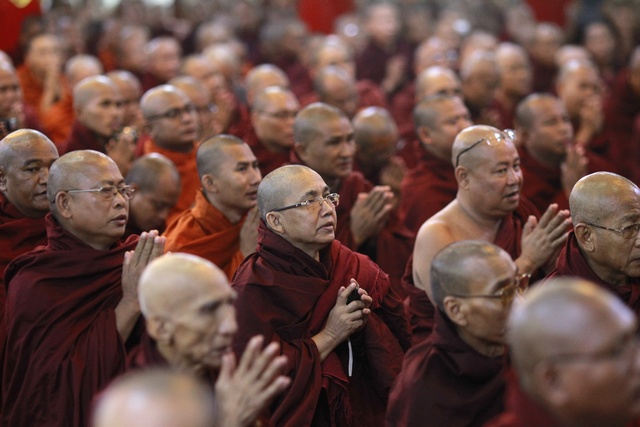A prominent monk and outspoken advocate of Burma’s growing anti-Muslim movement has warned politicians to back a proposed ban on interfaith marriages or risk losing votes in the 2015 general election.
The threat was issued at a convention of over 1,500 senior monks in Rangoon on Thursday, where a new draft of the controversial legislation, which would require Buddhist women to obtain official permission before marrying a Muslim, was formally approved.
“I would want to know which representatives turn down the national race protection law when it is proposed [in parliament] – I will make it so that they get no votes in 2015,” Wimala Buddhi from Moulmein’s Mya Sadi monastery told the gathering. “A party that doesn’t win votes will end up in the drain.”
His words are largely viewed as an attack against opposition leader, Aung San Suu Kyi, who recently spoke out against the ban, describing it as a “violation of women’s rights and human rights”.
Wimala Buddhi is a fervent supporter of Burma’s ultra-nationalist “969” movement, which calls on Buddhists to shun Muslim shops and businesses, and is a close ally of its chief architect Wirathu. The threat has been circulated widely on social media, including on Wirathu’s Facebook page, where it has received hundreds of likes, shares and encouraging comments.
“That cow is no expert on religion and yet she wants to become president,” derided one user.
But Suu Kyi’s spokesperson from the National League for Democracy (NLD) scoffed at the threat during a telephone interview on Friday. “I am not afraid because these monks have no right to vote in our country,” said Nyan Win, referring to a religious edict that precludes members of the Sangha from participating in politics.
He also dismissed suggestions that the “969” movement had enough support to oust the NLD, which is expected to dominate the 2015 elections, adding that he did not think the draft would even make it to parliament.
“We don’t get any clear views from the government, [but] I think they will act according to the law, and this law is against human rights,” he said.
The law demands that any Muslim man, who wants to marry a Buddhist woman, must first convert to her religion. Meanwhile, Buddhist women are obliged to obtain permission from her parents and local authorities before marrying a non-Buddhist man. An earlier draft of the law only targeted Muslims, but was recently amended to include members of all other faiths.
The proposal has prompted outrage from women’s groups in Burma, who say they will lobby against its implementation. The secretary of Burma’s national human rights commission has also slammed it as “unconstitutional”.
However, a growing number of monks and religious leaders have spoken out in support of the draft law and called on Suu Kyi to revise her position. Thursday’s convention reportedly agreed to set up an association to pursue the interfaith marriage proposal, as well as other legal means to protect Buddhism.
The government has also come under fire for its failure to condemn the growing “969” movement, which has been linked to a rise in anti-Muslim violence in Burma. In an interview with reporters on Friday, the president’s spokesperson Ye Htut insisted that advocates of the marriage ban are “entitled” to free speech.
“It is normal in a democratic society for all people to participate [in discussions] on things necessary or said as necessary to change,” he said.
He also defended Wimala Buddhi, who is a member of the government-backed monastic body Sangha Maha Nayaka. “The abbot was expressing his individual point of view,” he said.
But critics have been quick to accuse the government of hypocrisy. During the pro-democracy uprising in 2007, where monks played a key role in protesting the military government, the Sangha Maha Nayaka issued a statement strictly prohibiting monks from participating in secular affairs.
Earlier this week, the government banned a controversial issue of Time Magazine, which branded Wirathu the “Face of Buddhist Terror”, prompting speculation that it was actively courting political support from the “969” movement.
Burma has seen a rise in religious tensions since last year, when Buddhists clashed with Rohingya Muslims in Arakan state, displacing some 140,000 people and killing over 200. Since March, renewed bouts of anti-Muslim violence, which have been directly linked to Wirathu’s “969″ campaign, have claimed another 44 lives.



